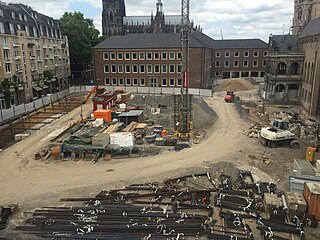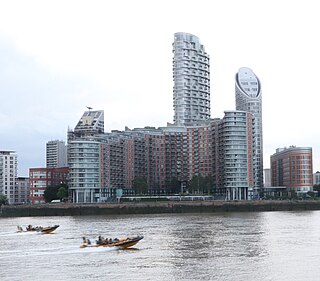Related Research Articles

Construction is a general term meaning the art and science to form objects, systems, or organizations, and comes from Latin constructio and Old French construction. To construct is the verb: the act of building, and the noun is construction: how something is built, the nature of its structure.

A condominium is an ownership regime in which a building is divided into multiple units that are either each separately owned, or owned in common with exclusive rights of occupation by individual owners. These individual units are surrounded by common areas that are jointly owned and managed by the owners of the units. The term can be applied to the building or complex itself, and is sometimes applied to individual units. The term "condominium" is mostly used in the US and Canada, but similar arrangements are used in many other countries under different names.
Facility management or facilities management (FM) is a professional management discipline focused on the efficient and effective delivery of logistics and other support services related to real property and buildings. It encompasses multiple disciplines to ensure functionality, comfort, safety and efficiency of the built environment by integrating people, place, process and technology, as defined by the International Organization for Standardization (ISO). The profession is certified through Global Facility Management Association member organizations.

Facilities engineering evolved from "plant engineering" in the early 1990s as U.S. workplaces became more specialized. Practitioners preferred this term because it more accurately reflected the multidisciplinary demands for specialized conditions in a wider variety of indoor environments, not merely manufacturing plants.

The United States Department of State Bureau of Overseas Buildings Operations (OBO) is responsible for overseeing the construction, management, and operations of U.S. diplomatic facilities around the world.
Property management is the operation, control, maintenance, and oversight of real estate and physical property. This can include residential, commercial, and land real estate. Management indicates the need for real estate to be cared for and monitored, with accountability for and attention to its useful life and condition. This is much akin to the role of management in any business.
As a legal term, ground rent specifically refers to regular payments made by a holder of a leasehold property to the freeholder or a superior leaseholder, as required under a lease. In this sense, a ground rent is created when a freehold piece of land is sold on a long lease or leases. The ground rent provides an income for the landowner. In economics, ground rent is a form of economic rent meaning all value accruing to titleholders as a result of the exclusive ownership of title privilege to location.
Commonhold is a system of property ownership in England and Wales. It involves the indefinite freehold tenure of part of a multi-occupancy building with shared ownership of and responsibility for common areas and services. It has features of the strata title and the condominium systems, which exist in Australia and the United States respectively. It was introduced by the Commonhold and Leasehold Reform Act 2002 as an alternative to leasehold, and was the first new type of legal estate to be introduced in English law since 1925.
Field service management (FSM) refers to the management of a company's resources employed at or en route to the property of clients, rather than on company property. Examples include locating vehicles, managing worker activity, scheduling and dispatching work, ensuring driver safety, and integrating the management of such activities with inventory, billing, accounting and other back-office systems. FSM most commonly refers to companies who need to manage installation, service, or repairs of systems or equipment. It can also refer to software and cloud-based platforms that aid in field service management.
A leasehold valuation tribunal (LVT) was a statutory tribunal in England which determined various types of landlord and tenant dispute involving residential property in the private sector. An LVT consisted of a panel of three; one with a background in property law ; one with a background in property valuation generally a qualified surveyor; and a layman, although some decisions of an LVT were decided by a single member. LVTs were non-departmental public bodies.
In English land law, a rentcharge is an annual sum paid by the owner of freehold land (terre-tenant) to the owner of the rentcharge (rentcharger), a person who need have no other legal interest in the land.

Burrells Wharf is a riverside residential estate, owned by its leaseholders, in London, England. It is situated in Docklands on the Isle of Dogs and the North bank of the River Thames. The residential estate is one of 18 buildings or groups of buildings on the peninsula to be architecturally listed as buildings of special interest or importance.
In England and Wales, the Commonhold and Leasehold Reform Act 2002 provides a right for leaseholders to change the appointment of the management of their building to another provider, by setting up a special company to take over from the freeholder those rights of appointment of management of the building.

Taylor Wimpey plc is one of the largest home construction companies in the United Kingdom.

The New Providence Wharf is a residential development in the Blackwall district of the London Borough of Tower Hamlets, at the north end of the Blackwall Tunnel. It was designed by Skidmore, Owings and Merrill and is managed by Ballymore, a property development company.
Ship management is the activity of managing marine vessels. The vessels under management could be owned by a sister concern of the ship management company or by independent vessel owners. A vessel owning company that generally has several vessels in its fleet, entrusts the fleet management to a single or multiple ship management companies. Ship management is often entrusted to third parties due to the various hassles that are involved in managing a ship. For instance, ships could be considered as large factories that travel across seas under various weather conditions for several days at a stretch. These vessels are equipped with several types of machinery that require appropriate maintenance and the associated spares on board. In the scenario of a vessel lacking adequate maintenance, this could lead to the breakdown of the equipment in the middle of a voyage at sea. A breakdown could be an expensive affair. A second scenario would be – a vessel is continuously on the move or under some sort of activity and hence requires a competent crew. The documents of the crew need to comply with international regulations, their transportation to and from the vessel must be arranged for, their competencies must align with the requirement of the vessel and must complement the skillsets of the existing onboard crew. Hence several parameters must be considered which is a tedious job.
A law practice manager, sometimes described as a legal practice manager or director of practice support, is a person with managerial responsibilities at a law firm. The duties of a law practice manager will depend upon the specific role and its purpose.

The Arc is a residential development located beside Abercorn Basin in the Titanic Quarter of Belfast, Northern Ireland. It contains 474 residential properties, a hotel, and a number of retail units, split across three buildings. The name "Arc" is an abbreviation for Abercorn Residential Complex, and also refers to the curved design of the buildings.

The United Kingdom cladding crisis, also known as the cladding scandal, is an ongoing social crisis that followed the Grenfell Tower fire of 14 June 2017 and the Bolton Cube fire of 15 November 2019. The fires revealed that large numbers of buildings had been clad in dangerously combustible materials, comprising a combination of flammable cladding and/or flammable insulation.
Fleecehold refers to the inclusion of onerous terms in the deeds of a freehold property or the lease of a leasehold property in the United Kingdom. The practice of fleecehold is known to be increasing in the UK, according to the results of FOI requests to the Land Registry. At a minimum, tens of thousands of houses are affected, but it is unknown how quickly the number is increasing. There have been several proposals by elected officials and campaign groups to abolish or mitigate the practice, and it has been questioned in Parliament and the devolved assemblies.
References
- The Institute of Residential Property Management
- The Association of Residential Managing Agents
- Facilities Management Association
- Japanese apartment management
- British Institute of Facilities Management
- Park, A. (1994) Facilities Management: An Explanation. Palgrave NY.